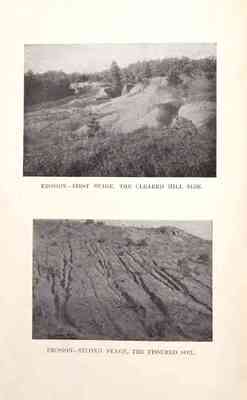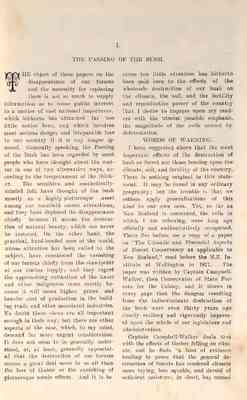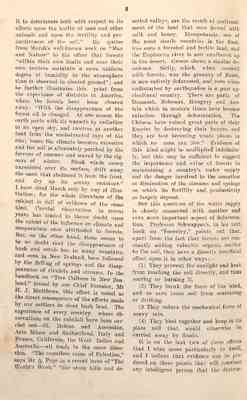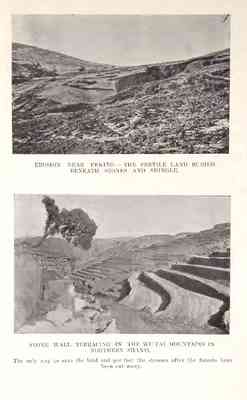Pages
This page is blank
[Illustration]
EROSION-FIRST STAGE. THE CLEARED HILL SIDE.
[Illustration]
EROSION-SECOND STAGE, THE FISSURED SOIL.
I.
THE PASSING OF THE BUSH.
THE object of these papers on the disappearance of our forests and the necessity for replacing them is not so much to supply information as to rouse public interest in a matter of vast national imporance. which hitherto has attracted far too little notice here, and which involves most serious danger and irreparable loss to our country if it is any longer ignored. Generally speaking, the Passing of the Bush has been regarded by most people who have thought about the matter in one of two alternative ways, according to the temperament of the thinker. The sensitive anhd aestheticallyminded folk have thought of the bush mostly has a highly picturesque asset among our manifold scenic attractions, and they have deplored its disappearance chiefly because it means the destruction of natural beauty, whcih can never be restored. On the other hand, the practical, hard-headed men of the world, whose attention has been called to the subject, have considered the vanishing of our forests chiefly from the standpoint of our timber supply; and theyr regret the approaching extinction of the kauri and other indigenous trees mostly because it will mean higher prices and heavier cost of production in the building trade and other associated industries. No doubt these views are all important enough in their way; but there are other aspects of the case, which, to my mind, demand far more urgent consideration. It does not seem to be generally appreciated that the destruction of our forests means a great deal more to us all than the loss of timber or the vanishing of picturesque scenic effects. And it is because too little attention has hitherto been paid here to the effects of the wholescale destruction of our bush on the climate, the soil, and the fertility and reproductive power of the country that I desire to impress upon my readers with the utmost possible emphasis, the magniture of the evils cause by deforestation.
WORDS OF WARNING.
I have suggested above that that the most important effects of the destruction o bush or forest are those bearing upon the climate, soil, and fertility of the country. There is nothing oringinal in this statement. It may be found in any ordinary geography; but the trouble is that we seldom apply generalisations of this kind to our own cae. Yet, so far as New Zealand is concerned, the evils to which I am referring, were long ago officially and authoritatively recognised. There lies befroe me a copy of a paper on "The Climatic and Financial Aspects of Forst Conservancy as applicable to New Zealand," read befroe the N.Z. Institute at Wellington in 1877. The paper was written by Captain CampbellWalker, then Conservator of State Forsts for the Colony, and it shows in every page that the dangers resulting from the indiscriminate destruction of the bush were even thrity years ago clearly realised and vigorously impressed upon the minds of our legislators and administrators.
Captain Campbell-Walker deals first with the effects of timber felling on climate, and he finds "a host of evidence tending to prove that the general destruction of forests has rendered climate more trying, less equable, and devoid of sufficient moisture; in short, has caused
6
it to deteriorate both with respect to its effects upon the health of man and other animals and upon the fertility and productiveness of the soil." He quotes from Marsh's well-known work on "Man and Nature" to the effect that forests "within their own limits and near their own borders maintain a more uniform degree of humidity in the atmosphere than is observed in cleared ground"' and he further illustrates this point from the experience of districts in America, where the forsts have eben cleared away: "With the disappearance of the forest all is changed. At one season the earth parts with its warmth by radiation to an open sky, and receives at another heat from the unobstructed rays of the sun; hence the climate becomes excessive and the soil is alternately parched by the fergour of summer and seared by therigours of winter. Bleak winds sweep unresisted over its surface, drift away the show that sheltered it from the frost, and drup up its scanty moisture." I have cited Marsh only by way of illustration; for the whole literature of the subject is full of evidence of the same kind. Careful observation in recent years has tended to throw doubt upon the extent of the influence on climate and temperative once attributed to forests. But, on the other hand, there seems to be no doubt that the disappearances of bush and scrub has in many countries, and even in New Zealand, been followed by the failing of springs and the disappearance of rivulets and streams. In the handbook on "Tree Culture in New Zealand," issued by our Chief Forester, Mr H. J. Matthews, this effect is notied as the direct consequence of the efforts made by our settlers to clear bush land. The experience of every country where observations on the rainfall have been carried out-St. Helna and Ascension, Asia Minor and Switzerland, Italy and France, California, the West Indies and Australia-all tens in the same direction. "The countless ruins of Palestine," says Mr A. Page in a recent issue of "The World's Work." "the stony hills and deserted vallyes, are the result of maltreatment of the land that once flowed with mild and honey. Mesopotamia, one of the most sterile countires in the East, was once a forested and fertile land, and the Euphrates river is now swallowed up in the desert. Greece shows a similar decadence. Sicily, which when covered with forests, was the granary of Rome, is now entirely deforested, and even when undistubred by earthquakes is a poor agricultural counry. There are parts of Denmark, Bohemia, Hungary and Austria which in modern times have become valueless through deforestation. The Chinese have ruined great part of their Empire by destroying their forests, and they are fast becoming waste places in which no man can live." Evidence of this kind might be multiplied indefinitely, bu this may be suffiicient to suggest the importance and value of forests in maintaining a country's water supply and the danger involved in the cessation or diminution of the streams and springs on which its fertility and productivity so largely depend.
But his question of the water supply is closely connected with another and even more improatnt aspect of deforestation. Professor Schwappach, in his text book on "Forestry," points out that, apart from teh fact that foresta are constantly adding valuable organic matter to the soil, they have a directly beneficial effect upon it in other ways:-
(1) They prevent the sunlight and heat from reaching the soil directly, and thus searing or burning it. (2) they break the force of the wind, and so save loose soil from scattering or drifting. (3 they reduce the mechanical force of heavy rain. (4) They bind together and keep in its place soil that would otehrwise be carried away by floods.
It is on the last two of these effects that I wish more particularly to dwell, and I believe that evidence can be producted on these points that will convince any intelligent person that the destruc
[Illustration]
EROSION NEAR PEKING - THE FERTILE LAND BURIED BENEATH STONES AND SHINGLE.
[Illustration]
STONE WALL TERRACING IN TEH WU-TAI MOUNTAINS IN NORTHERN SHANSI.
The only way to save the land and pro tect the streams after the forests have been cut away.




